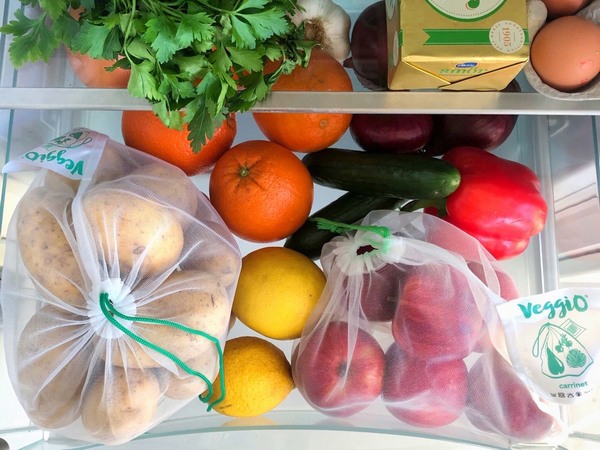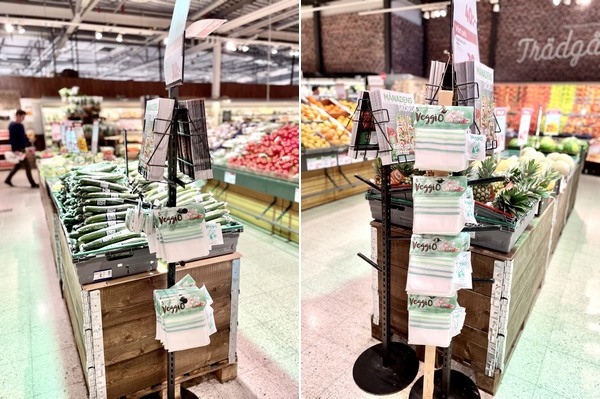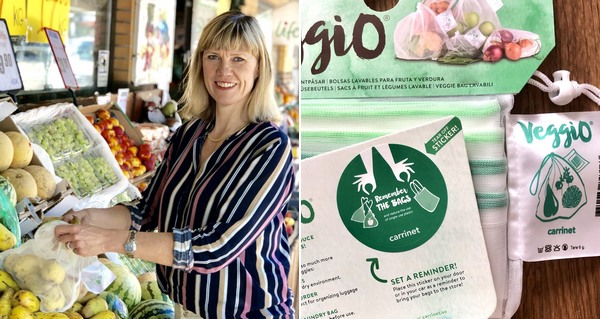The concept of the Veggio bag has been a long time in the making. Creator Mia Ekblad at Carrinet Ltd, who has been working on this project for over 12 years. “Working with environmental issues has been part of my business and personal life for a very long time. I live by the beach and have always been bothered by the amount of plastic waste and particularly plastic bags, that wash up on the shore. One day I was looking at a bag for my childrens’ toys, made out of net and started to think; how could this concept of reusable bags made out of nets be expanded?” she explains.
The Veggio was first launched in 2017 on a small scale, but Mia had a vision of the product being put to good use on a larger scale right away. “We faced a number of challenges at the beginning. The net bags had to be really good quality in order to be reusable, and in order to produce them on a larger scale we would need supermarkets on board, which means large volumes and a price that would work for them. There were also certain requirements that they would have to meet, for instance being as transparent as possible to allow them to work on the fresh produce scales, as many stores in Sweden use cameras to recognize the type of fruit being weighed.”

Supermarkets were quick to come on board with the concept, and Veggio was quickly adopted by a larger Swedish supermarket chain, with others in Norway, the UK, Spain, Germany, Hungary, Czechia and South Africa soon following. Recently, the product has gained popularity in Panama and Mexico too. Carrinet had also attempted its first foray into the US market, but this was put on hold due to the start of the COVID-19 pandemic and is only now being restarted as the success of the vaccine programme in this country allows it to reopen.
“One of the reasons Veggio is such a success with supermarkets is that we created it in collaboration with them. The high quality and strength means there are very few returns after purchasing. As mentioned before, Sweden has a lot of self-scan scales for fresh produce, so we worked with the stores to pick a material that would allow this, which was a process of trial and error that allowed us to come out with a great product. We have a lot of international experience and a good logistics system with very short delivery time, which allows us to be very varied.”

There are options for different packaging as well, we have a five pack that can be hung or stacked. We also have a three pack that can be hung or put in display boxes in different locations in the store. The packaging is very clear, you can see what’s inside, and the packaging is provided in different languages,” explains Mia.
There are also advantages over the traditional single use plastic bag for consumers, particularly on the environmental and sustainability side. It is a high-quality product that can be re-used endlessly, as the bags are made of high quality, food grade, recyclable polyester. And in regards to the container challenges, Carrinet has got enough Veggio in stock to supply Europe.
“Although we market the bags for fresh produce, they also passed the test for dairy, bread and meat. Some people even use the bag as a funnel to make nut milk. The material has been bleached or coloured, and it can be washed by hand or in the machine, when necessary. It doesn’t shrink or lose its shape. It is also breathable. Fruit and vegetables with ethylene aren’t going to ripen faster inside the bag, as the gas can dissipate outside the bag, as well as letting oxygen in, preventing mould. The Veggio material doesn’t react to mould, so it can be rinsed off without a problem,” according to Mia.

All bag types have advantages and disadvantages for the produce. What can be tricky is that you have to learn how to package the fruit in your bag. “Some products can dry out due to the airflow, so you have to tighten the bag to prevent this. I like to put a damp cloth around products like leafy greens to help it breathe without drying out. And of course you have to remember to bring the bag to the shop!” she laughs.
To help consumers with this, when you buy the bag you get a sticker that you can stick on your door or in your car, wherever you think you need it to remember to pick up the bag before you head into the store. Compared to the single use plastic bags, price could be seen as an obstacle at 2/4 euro for a three or a five pack respectively. However, on the long term this could save money and the planet, as long as you remember to bring them. There have also been steps made by EU Commissioner Frans Timmermans to ban single use plastic bags in the EU, although this is not a top priority yet. In some countries like Sweden, there is already a charge or tax for plastic bags for fresh produce, although it is still as low at 4 cents.
“A single use paper bag isn’t much better than a plastic one, as we do not have enough trees to maintain this. We need to reduce our food print and our consumption and the best way is to reduce and reuse everything that we have. The Veggio netbag is therefore a step in the right direction,” concludes Mia.
For more information:
Mia Ekblad
Carrinet AB
Storgatan 11
411 24 Göteborg, Sweden
Tel: +46-(0)10-209 14 50 Mobile +46-708-621212
Email: [email protected]










